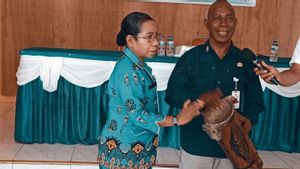YOGYAKARTA - The government imposes taxpayers for a person personally or an agency in accordance with the provisions of tax laws. Tax levies from taxpayers will be included and collected in the state treasury. That is why it is important to know when a person becomes a taxpayer.
Taxes paid by the public or a body to the state will be used for state needs. The use of taxes is based on interests for the benefit or prosperity of the community, such as infrastructure development, food subsidies, and so on.
Many people wonder whether tax obligations are determined based on age, number of income, or occupation status. Let's look at the provisions of when a person becomes a taxpayer.
The rules regarding tax obligations are contained in Law Number 36 of 2008. The law stipulates that a person becomes a Taxpayer if he has received or earned a large income exceeding Non-Taxable Income (PTKP).
Based on the Regulation of the Minister of Finance Number 101 of 2016, the amount of PTKP is IDR 54 million per year or around IDR 4.5 million per month. So if a person already has more than the amount above, he is required to register as a taxpayer.
So what if there are small children who already have a large income that exceeds PTKP? For example, an artist, content creator, or a small child who earns income from YouTube.
If there is someone who is under 18 years old but already has more income from PTKP, then his income will be combined with the income of his parents. So minors have not been charged as taxpayers.
Individuals or people who meet the criteria to become Taxpayers must register to get a Taxpayer Identification Number (NPWP) no later than 1 month after starting a free work or running a business.
Based on the Law on Harmonization of Tax Regulations that amend Law Number 16 of 2009, it is explained that every taxpayer who meets subjective and objective requirements according to the tax law is required to register himself with the Director General of Taxes (DJP).
Registration of taxpayers to DGT whose working area includes a place to live or place of taxpayer position and to him is given a NPWP. NPWP will use the population identification number (NIK).
The rules regarding subjective and objective provisions are contained in Chapter III regarding Income Taxes that amend Law no. 36 of 2008. The law explains that the subject of tax is a personal person, an inheritance that has not been divided into unity to replace those who are entitled, body, and also Permanent Business Forms (BUT).
Meanwhile, the tax object in question is any additional economic capacity obtained or received by Taxpayers, both from Indonesia and from outside Indonesia, which can be used for consumption or can increase wealth for the taxpayer concerned, by name and in any form.
The list of people who are required to register as Taxpayers has been regulated in the regulation of the Director General of Taxes Number: Per-20/PJ/2013. The following is a list of people who must be Taxpayers:
Such is the review of when a person becomes a Taxpayer. Provisions regarding the criteria or requirements of taxpayers have been regulated in the law so that the community must comply. Also read the formula for calculating the 2024 employee tax.
Stay up to date with the latest domestic and other overseas news on VOI. We present the latest and most updated nationally and internationally.
The English, Chinese, Japanese, Arabic, and French versions are automatically generated by the AI. So there may still be inaccuracies in translating, please always see Indonesian as our main language. (system supported by DigitalSiber.id)













